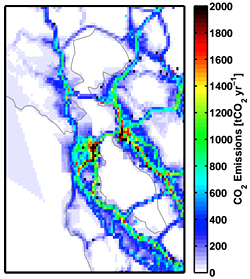Berkeley air-monitoring project wins White House nod
The White House has given a public nod to a ground-breaking UC Berkeley air-monitoring project and its new collaboration with a Colorado public media platform, which aims to build a citizen-science story-corps to help monitor carbon emissions in the Bay Area.
The Berkeley Atmospheric CO2 Observation Network’s new partnership was one of three “Climate Data in Action” efforts recognized in the Obama administration’s Climate Data Initiative, which announced its second phase this summer. In addition, two dozen “private sector innovators,” most of them corporations, who were recognized for making commitments to work with government data to build tools to make the country more resilient as a guard against climate change.

BEACON, Berkeley’s air monitoring project, has mounted 20 sensors on top of buildings, mostly schools and museums, across a swath of the East Bay. Most of them are in Oakland.
“You really can learn unique things about emissions and public health with a network of this density,” says BEACON project leader Ron Cohen, a UC Berkeley professor of chemistry.
“Each sensor tells you something different and unique about its part in the ecosystem.”
The monitors, first installed in 2012, are being upgraded, Cohen says.
The new collaboration with the iSeeChange digital platform has as its goal the development of a pilot citizen-science story corps to help monitor emissions and create an information network that will match data with local impacts over time.
Colorado-based iSeeChange currently maintains a crowd-sourced online climate journal, inviting people living in its area to post local weather conditions and anomalies. Its work involves citizens in the monitoring of climate change, and its founders envision similar networks all over the country.
The collaboration is seen as one way to help connect climate data being gathered by the BEACON monitors and people in the community, said Cohen.
“I thought, can we put the data out and get people thinking about how climate is being affected in their neighborhood,” he elaborated. “And we could get their reports.”
BEACON’s data, currently posted on the project website, will be poured into iSeeChange in the next six months, according to Cohen. http://beacon.berkeley.edu/Home.aspx
Read more about BEACON: UC Berkeley installing first CO2 network in Oakland
